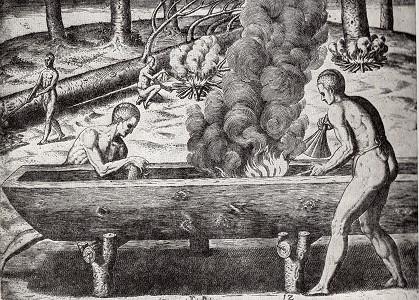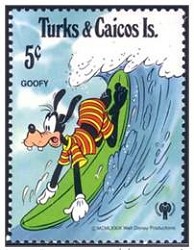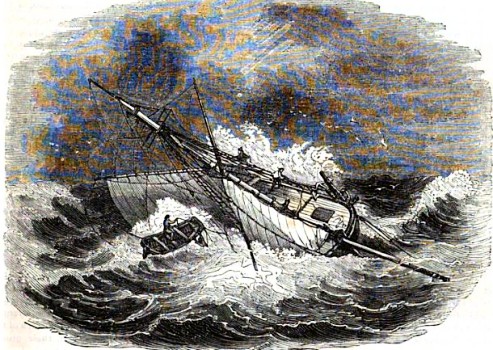As the pieces of plank which
they had detached from the inside of the boat were too
short, and were not sufficient to go quite round the
edge, they were obliged, when the sea ran very high, to
lie down several times along the gunwale on each side,
with their backs to the water, in order to prevent the
waves from entering the boat; and thus with their bodies
to repel the surf, whilst the other, with the Dutch hat,
was constantly employed in baling out the water; besides
which the boat continued to make water at the leak,
which they were unable to stop entirely.
It was in this melancholy
situation, and all of them quite naked, that they kept
the boat before the wind as well as they could.
The night of the first day after their shipwreck arrived
before they had well completed their sail; but although
it became quite dark, they contrived to keep the boat
running before the wind at the rate of about a league an
hour.
The second day was more calm; they each ate an onion, at
different times, and soon began to feel the effect of
thirst.
Towards night the wind became violent and variable,
sometimes blowing from the north, which caused them
great uneasiness, as they were then obliged to steer
south, in order to keep the boat before the wind, and
their only hope of being saved was on their proceeding
from east to west.
On the third day their
sufferings were excessive, as they had not only to
endure hunger and thirst, in themselves sufficiently
painful, but also the heat of the sun, which scorched
them in such a manner, that from the neck to the feet
their skin was as red and as full of blisters as if they
had been burned by a fire.
Smarting under this accumulation of bodily pain, the
captain seized the dog, and plunged the knife into his
throat.
They caught his blood in the hat, receiving in their
hands and drinking what ran over, and then drinking in
turn out of the hat, with which they felt themselves
very much refreshed.
The fourth day the wind was
extremely violent, and the sea very high, so that they
were more than once on the point of perishing: it was on
this day, in particular, that they were obliged to make
a rampart of their bodies to repel the waves.
About noon a ray of hope dawned upon them, but only to
experience bitter disappointment.
They perceived a sloop, commanded by Captain Southey, a
particular friend of Captain Aubin, which, like the
Betsey, belonged to the island of Barbadoes, and was
bound for Demerara; and this vessel came so near that
they could see the crew walking upon the deck, and
shouted to them: but unfortunately they were neither
seen nor heard.
Being obliged by the violence
Page 460
of the gale to keep the boat before the wind, for fear
of foundering, they had passed her a great
distance before she crossed them, the sloop steering
direct south, and they bearing away to the west.
This disappointment so discouraged the two seamen,
that they refused to make any more exertions to save
their lives; in spite of all that could
be said, one of them would do nothing, not even bale out the water which was
every minute gaining upon them.
In vain did the captain have recourse to entreaties, and,
falling on his knees, implore the assistance of the obdurate seaman; he remained unmoved; till at
length the captain and mate prevailed by threatening to
kill them instantly with the topmast, which
they used to steer by, and to kill themselves
afterwards, in order to put a period to their misery.
This menace seemed to make some impression on them,
and they resumed their occupation of baling as
before.
The captain this day set the others the example of eating a piece
of the dog with some onions : it was with great
difficulty that he swallowed a few mouthfuls, but in the course of an hour
afterwards he felt that this small morsel of food had given
them new vigour.
The mate, who was of a much stronger
constitution, ate more.
One of the men also tasted it; but the other, whose
name was Comings, absolutely refused to swallow a
morsel, protesting that he could not.
The fifth day was more calm, and the sea much smoother.
At day-break they perceived an enormous shark, full as
large as the boat, which followed them for several hours as
a prey that was evidently destined for him: they also
found in the boat a flying-fish, which had dropped there
during the night; this they divided into four parts,
which they chewed to moisten their mouths, and it
proved a very seasonable relief, though so little
inadequate to their necessities, that on this day,
when pressed with hunger and despair, the mate, Williams,
had the generosity to exhort his companions to cut off
a piece of his thigh, in order to refresh themselves with
the blood and support life.
The wind freshened during the night, and they
had several heavy showers, when they tried to get some
rain-water by wringing the trowsers which
served them for a sail, but when they caught it in
their mouths it proved to be as salt as that of the sea, the men's clothes having been so often soaked with
sea-water, that they, as well as the hat, were
impregnated with salt.
They had, therefore, no other resource, but to open
their mouths, and catch the drops of rain as they
fell upon their tongues to cool them: after the shower was over
they again fastened the trowsers to the mast.
On the sixth day the seamen,
notwithstanding all the remonstrances of the captain and mate, persisted in drinking sea-water, which purged them so excessively that they fell into a kind of delirium, and
were no longer of the slightest service in managing their frail
bark.
As for the others, they each kept a nail in their mouths,
and, from time to time, sprinkled their heads with
water to cool them; from these ablutions they found
their heads were more easy, and themselves generally
better.
They also tried several times to eat of the dog's flesh with a morsel of onion, and
thought themselves fortunate if they could get down
three or four mouthfuls.
On the seventh day the weather was
fine, with a moderate breeze, and the sea perfectly calm.
The two men who had drank sea-water grew so weak about noon that they began to
talk wildly, like those who are light-headed, not
knowing any longer whether they were at sea or on shore.
The captain and mate were also so weak that they
could hardly stand on their legs, or steer the boat in their
turns, much less bale the water from the boat, which now
made considerably at the leak.
On the morning of the eighth day, John Comings died, and about three
hours afterwards the other seaman,
George Simpson, also expired.
That same evening, just before the sun had
withdrawn his light, they had the inexpressible
satisfaction of discovering the high lands on the west point of the island of Tobago.
Hope inspired them with courage and infused new
strength into their limbs.
They kept the head of the boat towards the land all night,
with a light breeze and a strong current, which was in
their favour.
The captain and mate were that night in an
extraordinary situation; their two comrades lying dead
before them, with the land in light,
having very little wind, to approach it, and being
assisted only by the current which
drove strongly to westward.
In the morning, according to their own computation,
they were not more than five or six leagues
from the land, and that happy day was the last of their
sufferings at sea.
They kept steering the boat the whole day
towards the shore, though they were no longer able to
stand.
Towards evening the wind lulled,
and at night it was a perfect calm; but about two
o'clock in the morning the current cast
them on the beaches of Tobago, at the foot of a high shore
between Tobago and Man-of-War Bay, which is the easternmost
part of the island.
The boat soon bulged with the shock, and her
two fortunate occupants crawled to the shore, leaving
the bodies of their two
deceased comrades in the boat, and the remainder of the dog, which, by this time, had become quite
putrid.
They clambered, as well as
they could, on all-fours along the high coast,
which rose almost perpendicularly to the height of three or four hundred
feet.
A great number of leaves had
fallen on the place where they were, from the numerous trees
which grew over their heads, and these they collected
to lay down upon
Page 461
they waited for the coming
daylight.
As the dawn appeared they began to search for
water, and found some in the holes of the rocks, but it was brackish, and not fit to
drink.
They also found on the rocks several
kinds of shell-fish, some of which they
broke open with a stone, and chewed them to moisten
their mouths.
Between eight and nine
o'clock in the morning they were perceived by a young
Caraib, who was alternately swimming and walking
towards the boat.
As soon as he had reached it, he called his
companions with loud shouts, at the same time
making signs of the greatest compassion.
His comrades instantly followed him, and swam
towards the captain and mate, whom they had perceived
almost at the same time. The eldest of the party, a man apparently about sixty years of age,
approached them with the two youngest,
whom they afterwards learned were his son and
son-in-law.
At the sight of the poor sufferers, these compassionate men
burst into tears, while the captain
endeavoured, by words and signs, to make them
comprehend that he and his mate had been at sea for nine
days, in want of every thing.
The Caraibs understood a few
French words, and signified that they would fetch a
boat to convey them to their dwelling.
The old man then took a handkerchief from his
head, and tied round the captain's
head, and one of the young Caraibs gave Williams his straw hat; the other swam
round a projecting rock and brought them a calabash
of fresh water, some cakes of cassova, and
a piece of boiled fish; but they had been so long
without food that they were unable to eat any.
The two others took the corpses out of the boat and laid them upon the rock, after
which all three of them hauled the boat out of the water.
They then departed to fetch their canoe, leaving the poor
shipwrecked mariners with every mark of the utmost compassion.
About noon they returned
in their canoe, to the number of six, and
brought with them, in an earthern pot, something
resembling soup, which they thought to be delicious.
Of this they partook, but the captain's
stomach was so weak that he immediately cast it up
again.
In less than two hours they arrived at Man-of-War Bay, where the huts of the Caraibs were situate.
They had only one hammock, in which the hospitable
natives laid the captain,
while the women, who were in the hut, made
them a very agreeable mess of herbs and
broth of quatracas
and pigeons.
They also bathed his feet with a decoction of tobacco and
other plants, and every morning the man lifted
him out of the hammock and carried him in his arms beneath
a lemon tree, where he covered him with plantain
leaves to screen him from the sun.
There they anointed the bodies of the poor sufferers with a kind of oil, to cure
the blisters raised by the sun.
Their compassionate entertainers had even the generosity to give each of them a shirt
and a pair of trowsers, which they had procured from the ships that
came from time to time to trade with them for
turtles and tortoise-shell.
The method pursued by the natives in
healing the numerous wounds which had broken on the bodies of these
unfortunate mariners, was this: after they had
completely cleansed the wounds, they
kept the patient with his legs suspended in the air, and
anointed them morning and evening, with an oil
extracted from the tail of a small crab,
something resembling what the English call
the soldier-crab, because its shell is red and
which is obtained by bruising a quantity of the ends of their tails,
and putting them to digest upon the fire in a
large shell.
After thus anointing them they were covered with
plantain leaves till the wounds were
healed.
Thanks to the nourishing
food procured them by the Caraibs, and
the humane attention which was bestowed upon
them, the captain was able, in about three weeks time,
to support himself upon crutches, like a person
recovering from a very severe illness; but anxious
to return to his own friends, as early as possible,
he cut his name with a knife upon several boards,
and gave them to different Caraibs to show them to
any ships which might chance to approach the coast.
Still they almost despaired of seeing any
arrive, when a sloop from Oroonoko, laden with
mules, and bound for St. Pierre, in the island of Martinique,
touched at the sandy point on the west side of Tobago.
The Indians showed the crew a plank,
up on which was carved the name of Captain
Aubin, and acquainted them with the dreadful
situation of him and his companion, which those on board
the vessel related, when they arrived at St.
Pierre.
Several merchants with whom Captain Aubin was
acquainted, and who traded under Dutch colours,
happened to be there at the time, and
they transmitted the information
to the owners of the Betsey,
Messrs. Roscoe and Nyles, who instantly despatched a
small vessel in quest of the survivors, who, after living about nine
weeks with this benevolent and hospitable tribe of savages,
embarked and left them; their regret at doing so
being only equal to the joy and
surprize which they had experienced at meeting with
them.
As the vessel was
ready to depart, the natives
furnished them with an abundant supply of bananas,
figs, yams, fowls, fish, and fruits, particularly
oranges and lemons.
The captain had nothing to give them in return,
as an acknowledgment for their generous treatment,
but the boat, which they had repaired and used
occasionally for visiting their nests of turtles,
which, being larger than their canoes, was more
adapted to the purpose.
Of this he made them a present, and his friend,
Captain Young, who commanded the small
Page 462
vessel, assisted him to
remunerate his benefactors, by giving them all the rum he had
with him, which was about seven or eight
bottles.
He also gave them
several shirts and trowsers, some knives, fish-hooks
and sailcloth for the boat, with
needles and hooks.
At length, after two days
spent in preparations for their departure, they were
obliged to separate.
The Caraibs came down to the beach to the number of about thirty
men, women, and children, and all appeared to feel the deepest sorrow,
particularly the old man, who had acted as a father to them.
When the vessel left the bay, the tears flowed
from their eyes which still continued fixed upon their
departing friends, and they remained upon the beach, in a
line, until they lost sight of the vessel.
It was about cine o'clock
in the morning when the vessel sailed,
steering north-east, and in three days after they
arrived at Barbadoes, where they received, from the whole island,
marks of the most tender interest and the most generous
compassion; indeed, the benevolence of the inhabitants was unbounded.
The celebrated Dr. Hilery, the author of a treatise on the diseases
peculiar to the island, came to see them, accompanied by Dr.
Silihorn, and both prescribed various remedies, but
without effect.
Both of them were unable to speak but with the greatest
difficulty.
Williams remained at Barbadoes, but the captain, being
more affected and less robust, was advised, by the physicians, to
return to Europe.
In compliance with their advice he went to London,
where he was attended by some of the most celebrated physicians; and, after a
judicious treatment of about five
months, he was so far restored to a state of convalescence,
as to be enabled to resume his ordinary avocation.
Odile Gannier: In Search of Indian
Navigators.
When Europeans Discovered the Caribbean area, they were
astonished by the extraordinary development of the art
of navigation
among the Indians there.
The concept - and the very term Itself - of "canoe"
and "Pirogue" cam from the Antilles.
These Indian canoes along were, skillfully dug-out logs.
Paddled by a crew, they moved incredibly fast.
The discoverers, themselves sailors,
described and the manner in which the canoes were
built and cared for.
Indians in the Caribbean basin, whether they were
Arawak or Carib, belonged to neighbouring peoples such
as the Tupinamba, astutely Improved these boats in
many ways, demonstrating a y considerable level of
technical expertise.
The crews were not only sturdy and skillful, They were
good pilots with knowledge of the islands and a
remarkable system for taking bearings.
The problem of obtaining fresh supplies was diminished by fishing,
and preserving food for transportation.
Social life centred around the Indians' interest in
navigation.
The explorer's accounts shed light on the island and coastal societies of the
Caribbean and of northern South America, a subject that has had limited study.




